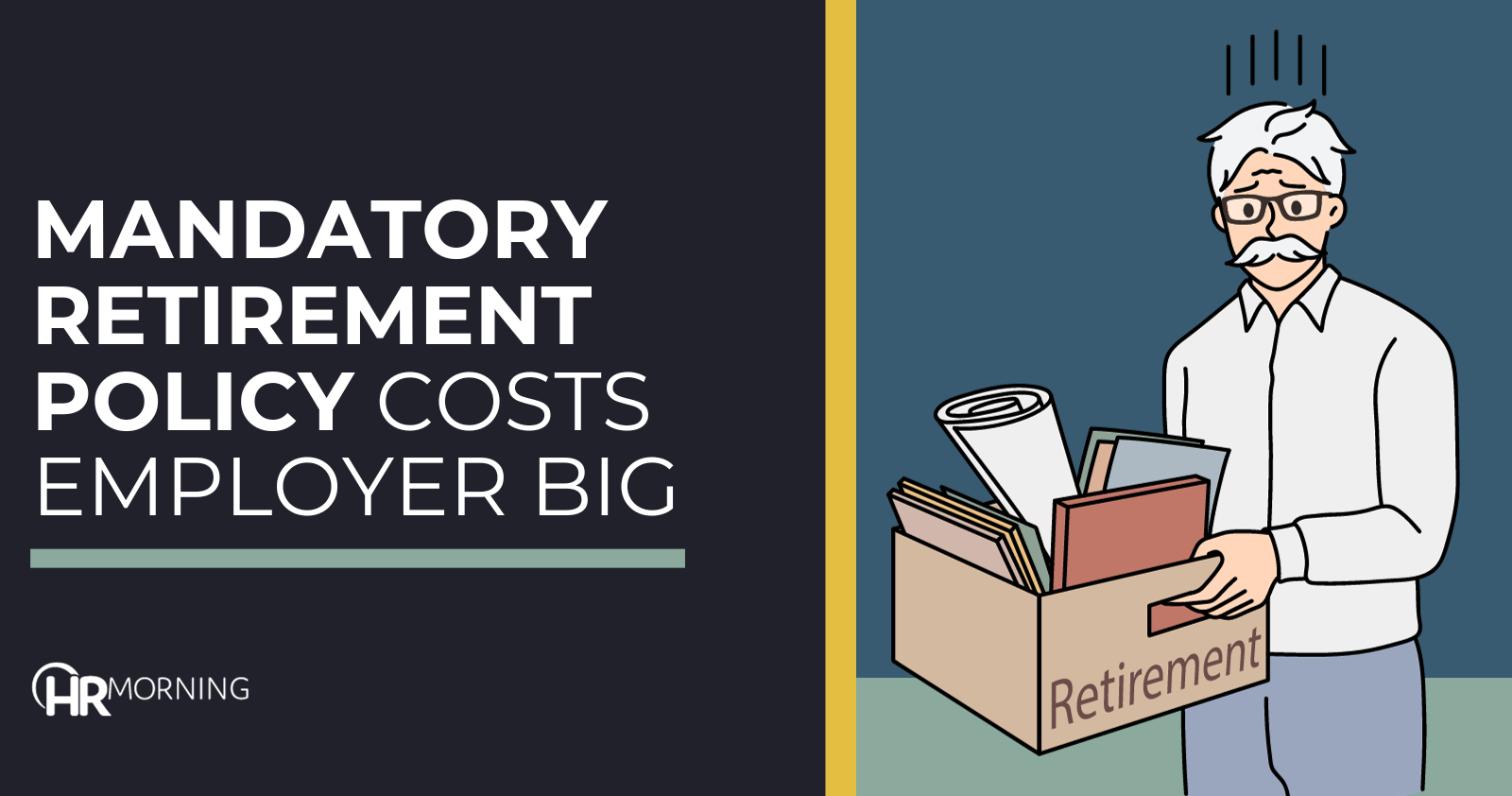Mandatory retirement policy costs employer nearly $7 million

Is mandatory retirement ever allowed? Or does it always violate laws banning age discrimination?
The short answer: Federal law generally bans such policies, but in very limited circumstances they are permissible.
Bottom line: Think long and hard before implementing such a policy – because chances are it’s illegal.
A medical group in San Diego now knows that mandatory retirement policies can be very dangerous, having agreed to pay $6.875 million to resolve an EEOC charge that its policy violated the federal Age Discrimination in Employment Act (ADEA) as well as the Americans with Disabilities Act (ADA).
In a press release announcing the settlement, the EEOC said Scripps Clinical Medical Group broke the law by applying the policy to physicians regardless of their ability to do their job.
Scripps did not admit to liability, but it did agree to enter into a four-year conciliation agreement with the agency.
Pursuant to the agreement, Scripps will rescind its age-based mandatory retirement policy and clearly tell its employees that it will not apply any policy that makes age a factor with respect to employment decisions.
In addition, leadership and HR personnel will attend ADEA and ADA training.
Mandatory retirement: Usually a no-go
The federal ADEA and many corresponding state laws generally ban employment discrimination based on age. At the federal level, protection from age discrimination in employment begins at age 40.
The ban is broad: It applies to all aspects of the employment relationship, and it encompasses a ban on age-based harassment. In addition, even a facially neutral policy (that is, a policy that applies to all) might run afoul of the law if it negatively impacts older employees and is not based on a reasonable factor other than age.
Under limited circumstances, a mandatory retirement policy may be justified.
Mandatory retirement and BFOQs
Example 1: An employer may justify a mandatory retirement policy by showing that age qualifies as what is called a bona fide occupational qualification, or BFOQ.
This defense may effectively be applied in cases involving safety-sensitive positions, such as airline pilots or other transportation employees.
But generally speaking, it is a very high hurdle to clear for a number of reasons.
First, as an exception to the general ban on age discrimination, it is narrowly construed.
Second, the burden to show that age is truly a BFOQ is always on the employer asserting the defense.
Third, the test to prove the defense is stringent. Specifically, the employer must show that the limitation “is reasonably necessary to the normal operation of the particular business.” It must also show either that all or most of the individuals excluded by the age rule are in fact disqualified, or that some of the excluded individuals have a disqualifying trait that cannot be discerned in another way.
The employer must also show in cases involving public safety that exclusion is the only acceptable path to take.
Executives and policymakers
Example 2: Executive or high policymaking employees. The federal ADEA specifically builds in an exemption for what it calls “bona fide executive or high policymaking employees.”
This is another narrow exception to the general rule.
Under it, employers can force retirement at age 65 for any employees who have been executives or high policymakers for at least the immediately preceding two years. The employee must be entitled to an annual retirement benefit of at least $44,000.
So just what is an “executive” or “high policymaking employee” under this rule? The EEOC has indicated that to be a bona fide executive, the employee must:
- Manage either the entire organization or one of its departments or subdivisions
- Direct at least two other employees
- Plays a significant role with respect to hiring and firing
- Regularly exercises discretion, and
- Spend the majority of their time on the activities described above.
The category fits only “top-level employees who exercise substantial authority,” the EEOC advises.
As to what makes a “high policymaker,” the agency says the term applies to those who do meet the definition of “executive” but “nonetheless play a significant role in developing and implementing corporate policy.”
Bottom line
Though the legality of a mandatory retirement policy is ultimately dependent on the specific facts at hand, in the vast run of cases they are likely to be deemed impermissible. For that reason, they are to be avoided unless you can establish with certainty that one of the limited exceptions is clearly applicable.

